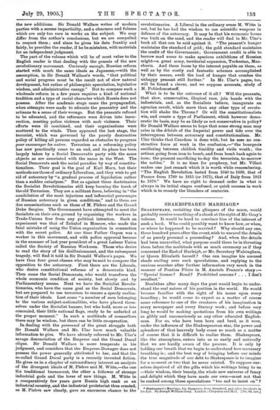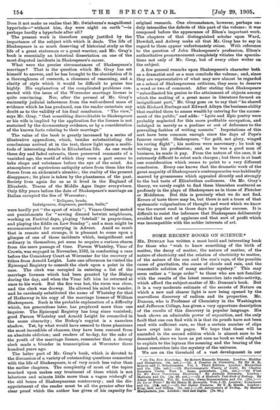SHAKESPEARE'S MARRIAGE.*
SHAKESPEARE, revisiting the glimpses of the moon, would probably receive something of a shock at the sight of Mr. Gray's volume. It would be hard to convince him of the interest of such a book. Who could possibly want to know how, or when, or where he happened to be married ? Why should any one, three hundred years after the event, wish to unravel the details of so purely personal a proceeding? And, when the details had been unravelled, what purpose could there be in thrusting them before the multitude with as much ceremony as if they concerned the Earl of Burleigh, or Mr. Secretary Walsingham, or Queen Elizabeth herself ? One can imagine his amused shade smiling over such speculations, and replying to the anxious searcher after further information very much in the manner of Pontius Pilate in M. Anatole France's story :— " Special license ? Bond ? Prohibited seasons ? . . . I don't recollect."
Doubtless after many days the poet would begin to under- stand the real nature of his position in the world. He would become familiar with the sight of his name upon every hoarding ; he would come to expect as a matter of course some reference to one of the creatures of his imagination in every newspaper and every literary work ; and before very long he would be making quotations from his own writings as glibly and unconsciously as any other educated English- man. For us, who have been born and bred, as it were, under the influence of the Shakespearean star, the power and splendour of that heavenly body come so much as a matter of course that it is difficult to realise them. Shakespeare, like the atmosphere, enters into us so easily and naturally that we are hardly aware of the process. It is only by holding our breath that we begin to understand bow necessary breathing is ; and the best way of bringing before our minds the true magnitude of our debt to Shakespeare is to imagine for a moment or two that he never existed. To suppose our- selves deprived of all the gifts which his writings bring to us —their wisdom, their beauty, the whole new universe of fancy and delight which they have made our 'own—must not that be ranked among those speculations "too sad to insist on" P * Shakespeare's Marriage, his Departure from Strafford, and other Incidents in his Life. By Joseph William Gray. London : Chapman and Hall. [10s. 6d. net. J
Does it not make us realise that Mr. Swinburne's magnificent hyperbole—" without him, day were night on earth "—is perhaps hardly a hyperbole after all ?
The present work is therefore amply justified by the importance of the subject with which it deals. The life of Shakespeare is as much deserving of historical study as the life of a great statesman or a great warrior, and Mr. Gray's book is essentially an historical dissertation on one of the most disputed incidents in Shakespeare's career.
What were the precise circumstances of Shakespeare's marriage ? That is the question which Mr. Gray has set himself to answer, and he has brought to the elucidation of it a thoroughness of research, a closeness of reasoning, and a clarity of style which it would be difficult to praise too highly. His explanation of the complicated problems con- nected with the issue of the Worcester marriage license is quite convincing. Nor, after the perusal of Mr. Gray's eminently judicial inferences from the well-ordered mass of evidence which he has produced, can the reader entertain any doubt as to the validity of his final conclusion. "The view," says Mr. Gray, "that something discreditable to Shakespeare or his wife is implied by the application for the license is not sustained by the documentary evidence, or by a consideration of the known facts relating to their marriage."
The value of the book is greatly increased by a series of illustrative appendices, which, besides substantiating the conclusions arrived at in the text, throw light upon a multi- tude of interesting details in Elizabethan life. As one reads these dry and faded extracts, these preserved remnants of a vanished age, the world of which they were a part seems to take shape and substance before the eye of the mind. An atmosphere of mysterious antiquity arises from them like the fumes from an alchemist's alembic ; the reality of the present disappears ; its place is taken by the phantasma of the past. Society lives again for us as it lived in the England of Elizabeth. Traces of the Middle Ages linger everywhere. Only fifty years before the date of Shakespeare's marriage an Italian occupied the See of Worcester ; " Reliques, beads, Indulgences, dispenses, pardons, bulls,"
were hardly yet "the sport of winds "; Vicars-General meted out punishments for "sowing discord betwixt neighbours, working on Festival days, playing foteball ' in prayer-time, and playing the fiddle on Low Sunday "; and a man might be excommunicated for marrying in Advent. Amid so much that is remote and strange, it is pleasant to come upon a glimpse of one of those incidents which, insignificant and ordinary in themselves, yet seem to acquire a curious charm from the mere passage of time. Parson Whateley, Vicar of Crowle, was engaged in November, 1582, in conducting a case before the Consistory Court at Worcester for the recovery of tithes from Arnold Leight. Late one afternoon he visited the Episcopal Registry to consult the clerk upon a point in the case. The clerk was occupied in entering a list of the marriage licenses which had been granted by the Bishop during the day, and when the -Vicar left him he returned at once to his work. But the fire was hot, the room was close, and the clerk was drowsy. He allowed his mind to wander, and he carelessly substituted the name of Whateley for that of Hathaway in his copy of the marriage license of William Shakespeare. Such is the probable explanation of a difficulty which, ten generations later, has perplexed more than one inquirer. The Episcopal Registry has long since vanished; good Parson Whateley and Arnold Leight lie reconciled in the same obscurity ; the Bishop's copyist is a nameless shadow. Yet, by what would have seemed to these phantoms the most incredible of chances, they have been rescued from an absolute oblivion; and readers of to-day, for the sake of the youth of the marriage license, remember that a drowsy clerk made a blunder in transcription at Worcester three hundred years ago.
The latter part of Mr. Gray's book, which is devoted to the discussion of a variety of outstanding questions connected with the life of Shakespeare, is of very much less value than the earlier chapters. The complexity of most of the topics touched upon makes any treatment of them which is not laborious and minute little more than a vague rgchauffe of the old bones of Shakespearean controversy ; and the dis- appointment of the reader must be all the greater after the clear proof which the author has given of his capacity for
original research. One circumstance, however, perhaps un- duly intensifies the defects of this part of the volume: it was composed before the appearance of Elton's important work. The chapters of that distinguished scholar upon Ward, Dowdall, and Aubrey make all that Mr. Gray has to say in regard to them appear unfortunately otiose. With reference to the question of John Shakespeare's profession, Elton's authoritative pronouncement completely vitiates the specula- tions not only of Mr. Gray, but of every other writer on the subject.
A few general remarks upon Shakespeare's character both as a dramatist and as a man conclude the volume; and, since they are representative of what may now almost be regarded as a school of Shakespearean criticism, they seem to deserve a word or two of comment. After stating that Shakespeare "subordinated his genius to the attainment of objects among which the making of a great name in literature formed an insignificant part," Mr. Gray goes on to say that "he shared with Richard Burbage and Edward Alleyn the business ability that enabled them to amass wealth by catering for the amuse- ment of the public," and adds : "Lyric and Epic poetry were probably neglected for this more profitable occupation, and. indulged in merely as a pastime or out of deference to the prevailing fashion of writing sonnets." Imputations of this sort have been common enough since the days of Pope's famous couplet. Shakespeare, "for gold, not glory, winged his roving flight" ; his motives were mercenary ; he took up writing as his profession; and, as he was a good man of business, he made it pay. From the nature of the case, it is extremely difficult to rebut such charges ; but there is at least one consideration which seems to point to a very different conclusion. Every one knows that the dramatic work of the great majority of Shakespeare's contemporaries was habitually marred by grossnesses which appealed directly and strongly to the bad taste of Elizabethan audiences. On Mr. Gray's theory, we surely ought to find these blemishes scattered as profusely in the plays of Shakespeare as in those of Fletcher or Middleton. But this is precisely what we do not find. Errors of taste there may be, but there is not a trace of that systematic vulgarisation of thought and word which we know was the surest road in those days to popular success. It is difficult to resist the inference that Shakespeare deliberately avoided that sort of applause and that sort of profit which was incompatible with the nobler interests of art.







































 Previous page
Previous page